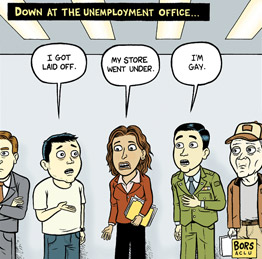
If Friday’s tired, old defense of “Don’t Ask, Don’t Tell” (DADT) by former Air Force chief of staff Merrill McPeak in The New York Times is the best that opponents of repeal can come up, we nearly have this struggle won! If you needed any further evidence, just check out this piece on Huffington Post on the dirty little secret behind the letter being consistently touted by Sen. McCain (R-Ariz.) in opposition to repeal, which he says is signed by over a thousand retired and flag general offices. I’ll give you a little hint, there are a lot of very old (the average age is 74) and, in at least a few cases, dead guys on the letter.
But to get back to McPeak, he runs through all of the typical nonsense that opponents of repeal always bring up – it’s not the job of the armed forces to advance civil rights, repealing this policy now while we are engaged in two active war zones threatens to undermine unit cohesion, etc.. I don’t want to spend too much time discussing each misguided point raised in the op-ed, but this one in particular cried out for a response –
Thus allowing an openly gay presence in ranks will be very difficult until we have committed leadership for it. I certainly had trouble figuring out how to provide such leadership in 1993. While I believed all people are created equal, I did not believe such equality extended to all ideas or all cultures.
While McPeak’s views on equality would make George Orwell laugh, more telling is his rather candid statement that repealing DADT will take committed leadership, something that he lacked both in 1993 and today. Some things apparently don’t change with time.
What has in fact changed, are the views of members of our armed services. According to a 2006 Zogby poll, one in four troops who have served in either Afghanistan or Iraq know a member of their own unit who is gay. The same poll found that an overwhelming 73 percent of military personnel report being comfortable with those who are lesbian or gay.
Perhaps more telling is the fact that the lead sponsor of legislation in the House of Representatives to repeal DADT is none other than the first Iraq War veteran to be elected to Congress – Patrick Murphy of Pennsylvania. In discussing the counter-productive nature of DADT, Murphy said, “My battle buddy in one of the toughest courses in the Army got kicked out because he happened to be gay. And the guy who took his place couldn’t carry his lunch.”
Murphy’s legislation, the Military Readiness Enhancement Act, has close to 200 co-sponsors. Earlier this week, Sen. Joseph Lieberman (I-Conn.), along with 12 original co-sponsors, introduced similar DADT repeal legislation in the Senate. Support among members of Congress for finally ending this illogical discrimination against otherwise talented and dedicated men and women is stronger today than ever before.
Finally, there is the testimony and statements from the likes of Joint Chiefs Chairman Mullen and Gen. Patraeus acknowledging their years of services alongside men and women who just happen to be gay. Much has indeed changed since 1993, perhaps most tellingly among those in positions of leadership who recognize that repealing DADT makes sense as much from a military perspective as it does as an issue of fundamental fairness.


